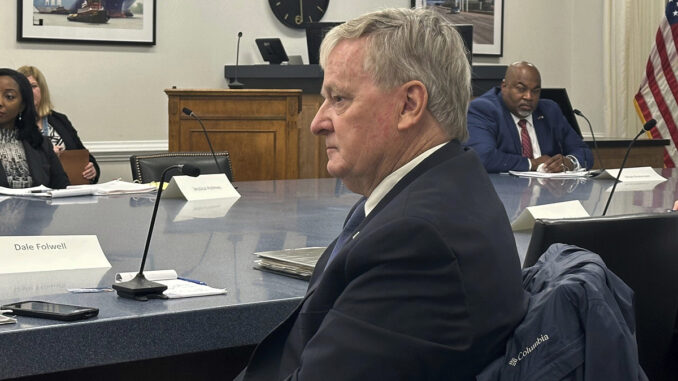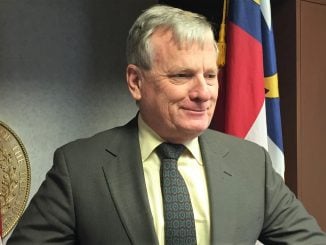
RALEIGH — In his monthly call with reporters, North Carolina State Treasurer Dale Folwell called for emergency funding to support the State Health Plan to keep it from being financed “on the back of those who teach, protect and otherwise serve.”
The treasurer is requesting $313 million from the state legislature to cover unreimbursed expenses from COVID-19 testing and treatment during the pandemic. Rising Medicare Advantage premiums will require an additional $66 million, bringing the total additional 2025 State Health Plan (SHP) funding needed to $155 million.
Folwell recapped the efforts of the ongoing Clear Pricing Project aimed at determining health care costs set by hospitals and health care providers which are being paid by SHP subscribers, and he said his office had eliminated the cost of diabetes testing and insulin for SHP members because of the “gouging we were seeing there.”
Folwell stressed that pricing transparency and cost reduction remain key goals in managing the state’s health care liabilities, specifically mentioning his Clear Pricing Project. During his tenure, he has called out excessive pay of hospital executives as well as recently issuing a report detailing overcharging of patients by hospitals in the state.
Additionally, the treasurer laid out some of the high costs that hit the SHP during the pandemic as well as issues with Medicare Advantage.
“We spent over $500 million dollars for actual COVID-related expenses, and we’ve only been reimbursed for about half of that,” Folwell told reporters.
“Lastly, we have enjoyed over the last several years of Medicare Advantage a rate that has resulted in zero premium to our members and zero cost to the taxpayers. Those days are over because of what’s happening to Medicare Advantage programs,” said Folwell.
“When you put all this together, it’s resulting in what I believe to be another spike in our OPEB unfunded health care liabilities,” Folwell said. “We have worked tirelessly to do two things: one is to lower health care costs, which would lower the trend on the unfunded health care liabilities; and No. 2 is to try to build up our reserve funding for our unfunded health care liability.”
The treasurer added when he took office the reserve was 2% funded and is now “about 10% funded.”
Folwell explained that several years ago the state had negotiated a 0% Medicare Advantage rate for SHP members, a $4 monthly rate for dependents and “no cost to the taxpayers.” He said they were unable to extend that deal due to a “federal loophole” blocking a fifth year of that rate deal.
Folwell said his office has asked the General Assembly to appropriate the funds needed.
“We’re still working with the General Assembly to reimburse this money,” said Folwell. “But there seems to be this attitude, from what I’ve understood by the General Assembly, you know, just take the money out of the woefully unfunded health care liability fund, which as I mentioned earlier we’ve worked hard to get it from 2% funded to 10% funded.”
GLP-1 weight-loss drug costs have also strained the SHP, and the costs of those drugs continue to rise. Folwell’s office said the state budget funded the SHP $240 million less than requested, not accounting for explosive spending growth on GLP-1 drugs like Wegovy and Saxenda.
To avoid depleting health care reserves by 2025, the SHP’s board voted to end coverage of GLP-1 drugs for weight loss starting April 1, 2024, due to high costs. Even with this change, the SHP will still need an additional $89 million in revenue for 2025.



